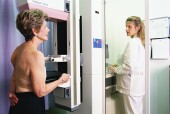Lidocaine Gel May Ease Mammography Discomfort
Authors say image quality unaffected, other expert unsure.
By Serena Gordon
HealthDay Reporter
|
E-mail this article
Subscribe to news
Printer friendly version
|

(SOURCES: Colleen Lambertz, M.S.N., M.B.A., F.N.P., nurse practitioner, radiation oncology department, St. Luke's Mountain States Tumor Institute, Boise, Idaho; Julia Smith, M.D., Ph.D., director, Breast Cancer Screening and Prevention Program, New York University Lynne Cohen Breast Cancer Preventive Care Program, New York City; July 22, 2008, Radiology, online)
TUESDAY, July 22 (HealthDay News) -- There's just no getting around the fact that mammograms are uncomfortable, but a new study suggests that applying a topical analgesic before the test could significantly ease the discomfort associated with the test.
And a test that's less painful may encourage more women to get screened, the researchers suggest.
"Mammography saves lives, and we would like women to know that if they're delaying or avoiding mammograms because they expect higher discomfort, they should try this product and see if it can become a better experience. It makes mammograms much more tolerable," said study author Colleen Lambertz, a nurse practitioner in the radiation oncology department at St. Luke's Mountain States Tumor Institute in Boise, Idaho.
Results of the study were in the July 22 online issue of Radiology, and were expected to be published in the journal's September print edition.
The American Cancer Society (ACS) recommends women over 40 receive an annual mammogram, because breast cancer that's caught early is easier to treat, and potentially to cure. If breast cancer is discovered before it has spread to the lymph nodes, the five-year survival rate is 98 percent. If cancer isn't found until it has spread to other areas of the body, the five-year survival rate is just 27 percent, according to the ACS.
Despite its lifesaving potential, as many as one-half to two-thirds of women don't follow screening guidelines, according to the study. A big factor, said Lambertz, may be the pain and discomfort associated with the test.
In an attempt to make the procedure less painful, Lambertz and her colleagues recruited 418 women between the ages of 32 and 89 who expected mammography to be painful and unpleasant. This group was randomly divided to receive pre-mammography acetaminophen, ibuprofen, a topical 4 percent lidocaine gel, or an oral or topical placebo. The gel was applied to the breast and chest wall between 30 minutes and 65 minutes before the test.
Women who used the lidocaine preparation reported significantly less breast discomfort, according to the study.
However, Dr. Julia Smith, director of the Breast Cancer Screening and Prevention Program at the New York University Lynne Cohen Breast Cancer Preventive Care Program, pointed out that the lidocaine didn't make a dramatic difference. She said that although women reported less discomfort with the lidocaine gel, they didn't report significantly higher satisfaction.
"What this study does highlight is that women shouldn't have to undergo this kind of pain. We should have an improvement in technology. Mammograms are unpleasant, and it's going to take more than giving people Tylenol; we need better technology," Smith said.
Smith also expressed concern that the gel might affect the quality of the mammogram, and that no large-scale study has been done to assess whether or not such a gel could interfere with image quality.
Lambertz said they found no difference in image quality for the women they studied.
What's most important, Lambertz said, is that women feel empowered. "We know that breast tenderness, anxiety and expectation of discomfort are all directly correlated with the amount of discomfort that women experience during their mammogram. Women can take measures to reduce breast tenderness -- pick a time for their mammogram when they expect their breast tenderness to be lowest, and apply the lidocaine gel one hour before their mammogram. They can then feel more confident that they will have a good experience and hopefully undergo more regular screening," she said.
Smith added that if you're very anxious about the test, you should let your doctor know so that you can discuss ways to ease your concerns.
The study was not funded by any pharmaceutical manufacturers.
More information
To learn more about mammography, visit the American Cancer Society. 
Copyright © 2008 ScoutNews, LLC. All rights reserved. 
HealthDayNews articles are derived from various sources and do not reflect federal policy. healthfinder.gov does not endorse opinions, products, or services that may appear in news stories. For more information on health topics in the news, visit the healthfinder.gov health library.